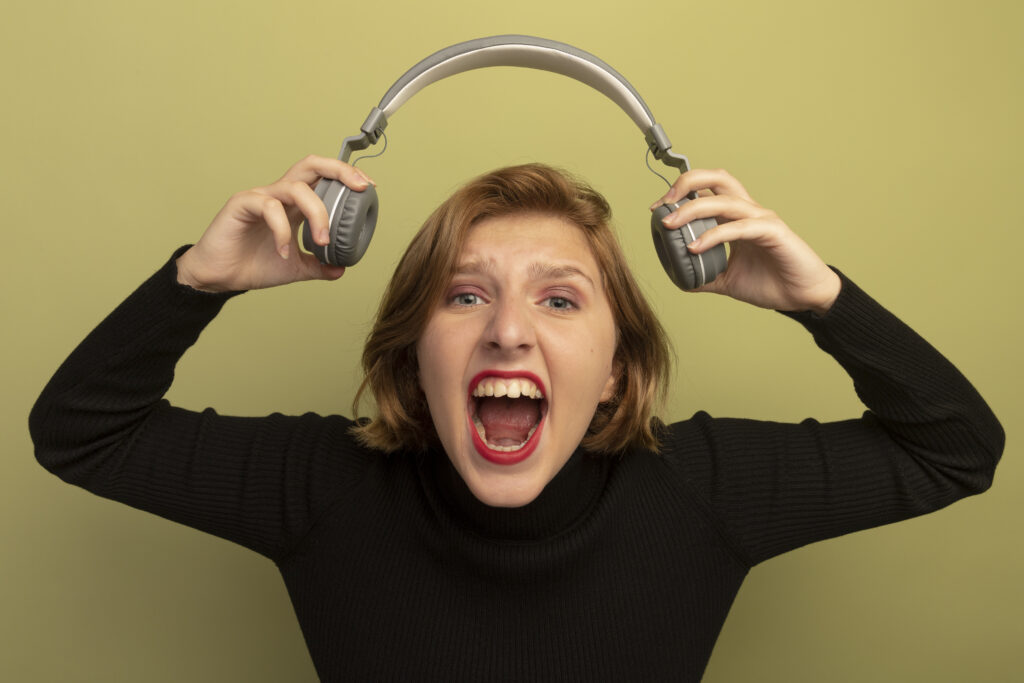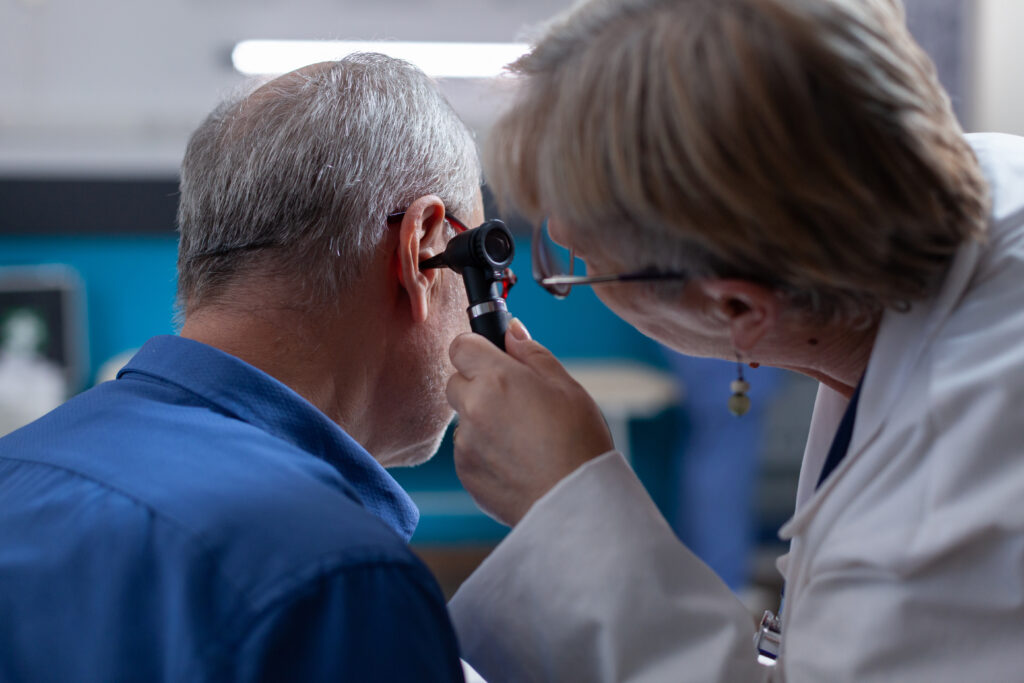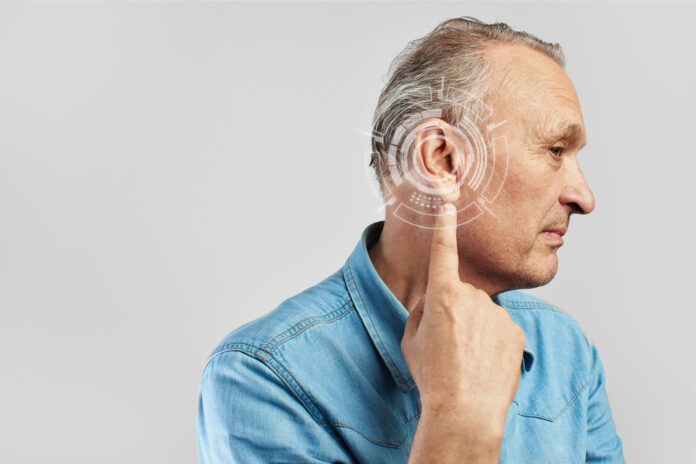With old age, you come across several symptoms of aging including Hearing Loss or hearing problems. The hearing issues come to you gradually as you age. Out of all well-known hearing conditions, the most common is hearing loss which is medically known as Presbycusis. People older than 70 often have the same age-related hearing problems and hearing loss symptoms are found in more than half of the population of the country with age 70 to 80. Hearing loss symptoms are usually linked with aging. However, people of every age are affected by this, from babies to older people. The most common cause of hearing problems is exposure to loud noise. There is no treatment for reversing hearing loss but some hearing-related problems can be improved with some treatment options. You can use devices to aid your hearing ability in this regard.
Usually aging and exposure to noise are responsible for such conditions but higher amounts of earwax can also cause this. Getting hearing back is not possible once it is lost but there are still some treatment options to improve the condition.
Overview of Hearing Loss
Harmful factors affect your hearing system i.e. your ear and ear canals, that lead to hearing loss. Hearing troubles you in many ways. For instance, you cannot understand, follow, and participate in a conversation actively. People often get offended by your hearing problems. You can’t attend online meetings and understand the talk on phone calls and the dialogues of a TV. show.
Your ability to work and communicate with others is an essential factor for making bonds with others. Hearing loss deprives you of this enjoyment of life. Audiologists are still working to devise more effective devices or ways to help the people affected by the condition. Although there is no reversal for hearing loss, audiologists recommend treatment options such as cochlear implants and hearing aids like hearing instruments to reduce the severity of symptoms.
Is Hearing Loss A Common Aging Sign?
As your age increases more hearing defects of hearing come to you. So it’s true that hearing loss is a common sign of aging. According to a report, 2 in 10 people in the country are living with some degree of hearing loss. The report also says that around 70,000 people are affected by one-ear hearing loss called unilateral hearing loss while 1 in 5 adults over 55 years have age-related hearing problems.
A medical survey published in 2023, showed that 3 out of 9 babies are born with hearing loss problems.
Types of Hearing Loss
Hearing loss can be categorized into three types:
- Conductive hearing loss (involving the outer or middle ear).
- Sensorineural hearing loss (involving the inner ear).
- Mixed hearing loss (this is the mix of the above two).
Conductive Hearing Loss: In this condition, sound cannot pass through your outer ear, ear canal, and middle ear.
Sensorineural Hearing Loss: Damage to the inner ear causes this type of hearing loss. It is further subdivided into sudden sensorineural hearing loss (SSHL) or sudden deafness. The former happens very quickly while the latter may happen over a few days.
Mixed Hearing Loss: Any issue in your middle or outer ear and your inner ear can cause this type of hearing issue.
Symptoms of Hearing Loss
Common symptoms of hearing loss are:
- Difficulty in understanding words and sentences especially when you are in a noisy place with a crowd.
- Muffling of speech and sounds.
- Difficulty in hearing letters of the alphabet that are consonants.
- Asking others to speak more loudly and slowly.
- Feeling a need to turn up the volume of television or radio.
- Tinnitus is a condition of ringing in the ears.
- Feeling irritation due to background noise.
- Avoiding some social settings.
Most people even do not identify the symptoms of hearing loss as they lose their hearing ability gradually. They are not able to notice what’s happening with them. So you must be conscious about such symptoms. If you experience the following symptoms, you may are more likely to develop hearing loss:
- Often thinking that people are mumbling.
- Asking people to repeat themselves.
- Feeling trouble in understanding the conversation especially when you are in a rush.
- Losing the ability to hear certain high-pitched sounds.
- Earache as your ear is hurting.
- Feeling a pressure of fluid inside your ear.
- Feeling dizzy most of the time.
- Having balance problems.
Also Read: https://onlinehealthpoint.com/how-to-get-perky-breasts-without-surgery/
Hearing Loss Symptoms in Children and Babies
Children and babies with hearing loss problems seem to have the following symptoms:
- Not reacting when you call them.
- Not saying single words by age 2.
- No starling to louder noise.
- Saying “huh” a lot.
- Not following instructions.
- Slow in learning and speaking than other other children of the same age.
- Having problems in speech.
- Turning up the volume of a tablet or mobile phone while watching videos.
Causes of Hearing Loss Many things take part in causing hearing loss such as exposure to very loud noises, short-term or long-term exposure to noisy places, and attending a concert. The ear has three major parts, consisting of the outer, middle, and inner ear. Sound waves reach your outer ear and then transfer to the middle ear or eardrum in the form of vibrations. The three small bones of the eardrum make the vibrations stronger and pass them to the inner ear. Here a snail-shaped part called the cochlea receives these vibrations. The vibrations create disturbances in the fluid present in the cochlea. Then tiny hairs found in the cochlea convert these vibrations into electrical signals that are sent to the brain through nerve cells. These electrical signals are converted into sound in your brain. This information will help you to understand the causes of hearing loss, which include:
Many things take part in causing hearing loss such as exposure to very loud noises, short-term or long-term exposure to noisy places, and attending a concert. The ear has three major parts, consisting of the outer, middle, and inner ear. Sound waves reach your outer ear and then transfer to the middle ear or eardrum in the form of vibrations. The three small bones of the eardrum make the vibrations stronger and pass them to the inner ear. Here a snail-shaped part called the cochlea receives these vibrations. The vibrations create disturbances in the fluid present in the cochlea. Then tiny hairs found in the cochlea convert these vibrations into electrical signals that are sent to the brain through nerve cells. These electrical signals are converted into sound in your brain. This information will help you to understand the causes of hearing loss, which include:
Tympanic Membrane Perforation: A loud noise can change the pressure in your ear. That causes eardrum damage. While poking the eardrum with a harmful object can also cause rupture of the eardrum that leads to hearing loss.
The Buildup of Excessive Earwax: An excessive amount of earwax can block the ear canals and not allow the sound waves to pass through the canals. Removal of the earwax canal helps in restoring hearing loss.
Inner Ear Damage: Wear and tear in the inner ear can be a major cause of hearing loss. The wear and tear in the ear are caused by the aging or loud noise that damages the hair or nerve cells in the cochlea that send sound vibrations to the brain. The hearing loss caused by this damage makes higher-pitched sounds muffled and you may find it difficult to pick out words against noise.
Tumors or Ear Infection: Tumors or unusual bone growth in the middle or outer ear can lead to hearing loss while ear infection is another cause of such condition.
Causes of Conductive Hearing Loss
- Tumors in the ear.
- Sticking something in the ear.
- Building up earwax.
- Eustachian tube damage.
- Ruptured eardrum.
- Congenital conditions that can affect the middle and inner ear of newborns.
Causes of Sensorineural Hearing Loss
- Heart diseases, diabetes, strokes, or high blood pressure.
- Old age.
- Inherited health conditions.
- Long-term exposure to loud noise like working in a noisy environment.
- Ototoxicity.
- Having an injury in the head.
Causes of Mixed Hearing Loss
As this is a mixed form of conductive and sensorineural hearing loss, it affects all parts of your ear i.e. outer, middle, and inner.
Risk Factors for Hearing Loss
Complications are associated with hearing loss that can worsen the condition. This disconnection may lead to frustration, irritability, and anger in you. Hearing loss triggers depression and anxiety. Often children with hearing problems cause lower grades in school because they remain in a struggle to understand the others’ conversation. Sometimes hearing loss can trigger the symptoms of dementia. Nerve cell damage also occurs when you lose hearing.
Read More: https://onlinehealthpoint.com/a-comprehensive-guide-to-engage-your-core/
Diagnosis of Hearing Loss
Physical examination and observation of symptoms help in diagnosing the condition. Your healthcare provider may check for any ear infection or any damage to the ear canal to diagnose hearing loss. A CT scan or MRI can detect any injury, damage, or tumor in your ear. You should contact an audiologist for proper diagnosis and to devise accurate treatment methods. Common tests are performed for diagnosis, including:
OAE: Otoacoustic Emission Test: This test is performed to check the function of your inner ear.
Pure-Tone Test: This is the way to find the quietest volume range that you can hear at different pitches. This test is carried out with a combination of some other tests such as headphones or bone conduction tests that help to determine which type of hearing loss you are experiencing.
Tympanometry: Movements of your eardrums can be observed through this test. Your healthcare provider performs this test to check the rupture in your eardrum. Stages of Hearing Loss
Stages of Hearing Loss
Hearing loss is typically classified into different stages according to the degree of loss. Your hearing tests will show the results that help explain what stage you are at. The degree of loss defines how louder sounds are needed to be heard by you. According to research, the degrees of hearing loss are:
- Normal.
- Slight.
- Mild.
- Severe.
- Profound.
- Moderate.
- Moderately severe.
Treatment and Management of Hearing Loss
Treatment of Conductive Hearing Loss
Ear diseases or ear infections first are treated with antibiotics. Several types of surgeries can be performed including, inserting ear tubes, removal of tumors, repairing ruptured eardrums, and tympanoplasty. Removal of objects from your ear canal or earwax can be helpful in this regard.
Treatment of Sensorineural Hearing Loss
Medications used to reduce swelling in your cochlea are beneficial for the treatment of this condition. Cochlear implants and hearing aids are also used for this purpose.
Treatment of Mixed Hearing Loss
This treatment depends on the type of damage your ear has.
Side Effects of Treatment
All treatment options have side effects however the surgeries have the most severe side effects:
- Sometimes surgery fails in fixing your ruptured eardrum, this is known as tympanoplasty complication. Its other side effects include scarring of the eardrum, fluid draining from your ear, and repeated ear infections.
- Failed ear tumor treatments increase the risks of facial weakness, balance issues, and permanent hearing loss.
- Implantation surgery for cochlear can damage your sense of body balance, nerve damage, and cerebrospinal leakages.
Prevention of Hearing Loss
Following the steps jotted below can help you prevent hearing loss:
Hearing Tests: If you’re an employee at a construction site or in a factory, go for regular hearing checkups. If you are experiencing some hearing issues, take steps to prevent further loss by consulting an audiologist.
Protection of Ears: Stay away from the nose to protect your hearing ability. Use plastic earplugs to protect your ears.
Limit Risks from Hobbies: Listening to rock concerts, riding a snowmobile, jet ski hunting, or using power tools are sources to damage your hearing. Wearing hearing protectors and avoiding noisy places can save you from any ear infection. In addition, listening to music at low volume is also advised for hearing protection.
How to Live with Hearing Loss?
Living with this disability is challenging but hearing aids can make it easy to some extent. Accurate treatments can save you from emotional stress, depression, and anxiety. You should consider sharing with your healthcare provider so that they may minimize the losses about your heating ability. However, if you experience the worsening of symptoms, immediately contact your doctor. They will provide you with different kinds of hearing support.
Conclusion
Hearing loss is a well-known disability that can be temporary or permanent. This condition affects your everyday activities and cannot be treated easily. Hearing loss makes you feel uncomfortable among other people as you feel disconnected from the world around you. You lose the opportunities for enjoyment due to hearing problems. You cannot enjoy the company of your friends and family, your favorite movies and shows. This makes you isolated and depressed. Therefore, it is advised to talk to your doctor for immediate medical help, if you experience any heating issues. They will devise the best treatment or management option for improving your hearing ability.







